|
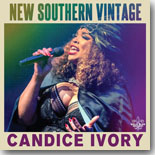 Candice
Ivory has been known as the Queen of Avant
Soul and has frequently recorded jazz-driven
original songs. Her first foray into the blues
was the award-winning When The Levee Breaks:
The Music of Memphis Minnie, one of the best
and most intriguing albums of 2024. Candice
Ivory has been known as the Queen of Avant
Soul and has frequently recorded jazz-driven
original songs. Her first foray into the blues
was the award-winning When The Levee Breaks:
The Music of Memphis Minnie, one of the best
and most intriguing albums of 2024.
Was that trip into
her blues roots a one-time thing? That was the
big question as to what would be next for Ms.
Ivory.
She just gave us a
definitive answer with the recent release of the
diverse and rootsy New Southern Vintage
(Nola Blue Records), with examples of multiple
styles of early blues brought into the 21st
century that fit the format.
The result is an
outstanding album that traverses across many of
the roots of the blues, all with Ms. Ivory's
spectacular vocals. She's backed by one of her
regular bands, The Blue Bloods, consisting of
Robert Allen Parker (guitar), Adam Hill
(guitar), Khari Wynn (bass), and Donnon R.
Johnson (drums).
The original
mid-tempo blues, "Ain't So Blind," kicks off the
album in fine form, a hypnotic number in the
style of John Lee Hooker's "Boom, Boom, Boom,"
with Parker and harp player Jan Hartmann trading
riffs throughout. "Blue Blood" is another Ivory
original, a raw 12-bar blues driven along by a
thumping drum beat, with uncredited vocals
supporting Ivory that sound so much like her
that I think her singing is dubbed in.
"I'm In Trouble" is
a mid-tempo blues shuffle, written by Joe Henry
Hicks, with plenty of slide guitar as well as
piano from guest Ben Levin. It's followed by a
Robert Allen Parker composition, the eerie, slow
blues, "Foolish Pleasure." Yubu Kazungu, based
in Memphis but originally from Nairobi, Kenya,
helps out on vocals, as he and Ivory trade
verses on this song, making me feel like it
could have been Robert Johnson doing this
number. Levin haunts the song even more
with whistle noises, as does the harmonica fills
from Hartmann.
We get a big
increase in tempo on the rollicking 12-bar piano
blues, "Lookin' For My Baby," which of course
keeps Levin on the session pounding away on the
88s like a crazed madman. Parker and Hill trade
guitar parts midway through the tune, kind of in
a ''cutting heads" way. If it was truly a
competition, I declare it a draw because they
are very fine guitarists.
Ivory takes us to
the Mississippi hill country on her own "Strong
Black Mattie," given a little touch of Memphis
funk with guitar effects and Chris Stephenson's
Hammond B-3 playing. There's a whole lot going
on with the slow blues, "Let Your Love Shine
On," a Parker original that wraps in Antonio
Vergara on lap steel guitar, wah, electric
guitar, and background vocals, and Stephenson
returning on organ. Ivory is at her best on
these slow, emotional songs, with one of her
best vocal performances on the album. This one
touches my soul the more times I hear it.
Changing the mood
still again, Ivory puts more power behind her
vocals on Parker's "Look Away," with a spooky
sound provided by Stephenson's B3. That leads
into a 37-second spoken word piece by Andrew
Cohen on folk traditions before we head way down
in the Delta on a version of "Catfish Blues"
that brings in Jimmy "Duck" Holmes on vocals and
guitar, Damian "Yella P" Pearson on harmonica,
and Levin on piano. Ivory doesn't sit this one
out, as we chimes in a vocals behind the iconic
Mississippi bluesman Holmes. A very well-done
example of the deep blues!
Ivory goes deep into
her roots on a version of "Corrina," backed only
by Levin on piano and David Evans on guitar.
This is another song that goes right to the
soul, especially with the rawer vocals from
Ivory. The same comment applies to her own
composition, "Crown Royal Bag Blues," with Levin
returning and Pearson sharing guitar duties with
Japanese guitar master Takuto Asano.
The Ivory / Levin /
Evans trio is back on the slow blues, "World Of
Trouble," one that she also covered on his
Memphis Minnie tribute, except this one has a
longer running time. Ivory really packs a big
wallop of emotion into her vocals this time
around.
The same trio teams
up on the closing number, "Shout The Boogie,"
another Memphis Minnie cover, adding Andy Cohen
for a second guitar. The title says it all. It's
a fast-moving boogie woogie number that gives
Levin a chance to show his piano skills. This
one lasts just over two minutes, but packs a lot
of fun into the short run time.
After these two
fantastic blues albums from Candice Ivory, we
can hope that she has found a new niche and will
keep putting out albums like the Memphis Minnie
tribute and New Southern Vintage. I
eagerly await the next one.
--- Bill Mitchell
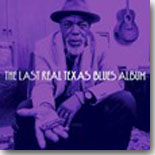 On
July 15, 1975, Antone's officially opened.
Dubbed “Austin's Home of the Blues” by its
owner, Clifford Antone, the Austin, Texas club
gave the blues a much-needed shot in the arm. It
became a draw for numerous veteran blues artists
in search of a place to play their music, such
as Muddy Waters, Jimmy Reed, Eddie Taylor, James
Cotton, and B.B. King. On
July 15, 1975, Antone's officially opened.
Dubbed “Austin's Home of the Blues” by its
owner, Clifford Antone, the Austin, Texas club
gave the blues a much-needed shot in the arm. It
became a draw for numerous veteran blues artists
in search of a place to play their music, such
as Muddy Waters, Jimmy Reed, Eddie Taylor, James
Cotton, and B.B. King.
It also gave a start
to newer blues bands – the Fabulous
Thunderbirds, Stevie Ray Vaughan and Double
Trouble, Lou Ann Barton, Angela Strehli, Marcia
Ball, Gary Clark Jr., Denny Freeman, and many
others.
The success of
Antone's also played a major role in building
Austin's reputation as a music city, leading to
a recording label (Antone's Records) and a
record store (Antone's Record Shop). Clifford
Antone died in 2006, but the club remains a
vital part of the Austin music scene, as does
the record store.
The record label is
now a part of New West Records. Last fall, to
celebrate Antone's 50th anniversary, an all-star
lineup gathered at Arlyn Studios in Austin and
Electrical Audio in Chicago to create The
Last Real Texas Blues Album (Antone's/New
West Records), an 18-song collection of songs by
some of the club's past legends from many of the
current line-up of blues stars.
The opening track is
a cool cover of Freddie King's “Going Down,”
with Bobby Rush on vocals and harp, backed by
Jimmie Vaughan and Derek O'Brien on guitars and
Benny Turner on bass. Turner himself sings on
Lowell Fulson's classic “Reconsider Baby,” with
support from O'Brien, Anson Funderburgh, and
Lurrie Bell on guitars, and Joe Sublett and Mark
“Kaz” Kazanoff on saxophones.
Jivin' Gene
Bourgeois (of Jivin' Gene and the Jokers) takes
the mic for Big Joe Turner's “Flip, Flop, and
Fly,” with Charlie Sexton and Eve Monsees
joining O'Brien on guitar. Houston soul singer
Kam Franklin ably handles Barbara Lynn's 1962
R&B hit “You'll Lose A Good Thing,” and Antone's
favorite Lil' Ed Williams adds a little Windy
City flavor as he covers his uncle J.B. Hutto's
“If You Change Your Mind,” with Johnny Moeller
also on guitar.
Longtime Antone's
veteran Kim Wilson & The Fabulous Thunderbirds
deliver a swaggering take on A.C. Reed's
“Talkin' 'Bout My Friends.” 22-year old McKinley
James gives a sterling interpretation of “Those
Lonely Lonely Nights,” influenced by both the
Earl King version and the Johnny “Guitar” Watson
versions, thanks to Kaz Kazanoff and Joe
Sublett's saxophones and Funderburgh and
O'Brien's fretwork.
Carey Bell provides
a superb slow burning read of the Elmore James'
standard “The Sky Is Crying,” with Sublett on
sax. Ruthie Foster sings “Lead Me On,” which was
written by Antone's favorite Miss Lavelle White
in the late 50's and became a hit when recorded
by Bobby “Blue” Bland. Foster's version of the
song retains much of the charm and feel of
Bland's, down to the horn charts.
Doyle Bramhall II
sings and plays guitar, bass, and harmonica on
Eddie Taylor's “Bad Boy,” for a bit more Chicago
via Austin blues, and Big Bill Morganfield, son
of Muddy Waters, continues the family connection
to Antone's with a gripping cover of R.L.
Burnside's “Just Like A Bird Without A Feather.”
John Primer, who
played with Waters at his final Antone's
appearance, takes on Jimmy Reed's “Honest I Do,”
with backing from Johnny Moeller of the Fabulous
Thunderbirds on guitar and Steve Bell on
harmonica. Guitarists Monsees. Carey Bell, and
Mike Keller join forces to recreate the late,
great Magic Sam's instrumental signature song
“Lookin' Good,” with vocal encouragement given
by ZZ Top's Billy F. Gibbons.
Lynn August passed
away this past February, but the zydeco star was
feeling fine when he cut a sharp cover of Guitar
Slim's “The Things That I Used To Do,” with
assistance from O'Brien and Monsees on guitars
and Marcia Ball on piano. C.J. Chenier works up
a version of Bill Carter's “Willie The Wimp”
that has a real zydeco flavor with O'Brien and
Funderburgh lending a hand on guitar, and Sue
Foley delivers on the Lazy Lester swamp blues
classic “You Got Me Where You Want Me.”
Kam Franklin returns
with a soulful read of “If (I Could Be With
You),” originally sung by Lavelle White back in
the day, and the 95-year-old Miss White herself
brings the set to a close with a sweet,
improvised performance, “Message from Miss
Lavelle,” backed by O'Brien on guitar, Ball on
piano, and Matt Farrell on organ.
The CD is sold
separately, but is also part of a bigger
Antone's 50's anniversary celebration project.
It's a five-disc, 41-track box set called
Antone's: 50 Years of the Blues that
includes a disc of rare and unreleased live
tracks, a disc of rare tracks compiled from the
record label's archive of songs, and a 7” single
from Los Lobos (“Three Hundred Pounds of Joy”),
along with a bound book of liner notes from Joe
Nick Patoski and a reissue of Susan Antone's
book Picture the Blues, loaded with rare
photographs.
Simply put, if you're a blues fan at all, you
need to have The Last Real Texas Blues Album
in your collection. This set was a labor of love
for all involved. It comes through on every note
played and sung.
--- Graham Clarke
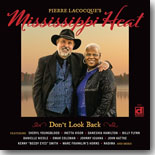 The
latest Mississippi Heat release, Don't
Look Back (Delmark Records), finds front man
/ harp ace Pierre Lacocque backed by a host of
Chicago blues masters, including vocalists
Sheryl Youngblood, Inetta Visor, Daneshia
Hamilton, Danielle Nicole, and Omar Coleman.
Also on the recording are guitarists Giles Corey
and Billy Flynn, keyboardists Johnny Iguana and
John Kattke, bassist Brian Quinn and Big Mike
Perez, drummers Jason “J Rock” Edwards and Kenny
“Beedy Eyes” Smith, Marc Franklin and Kirk
Smothers (horns), Anthony Alexander and Natalie
Bennison (percussion), and backing vocalists
Nanette Frank, Diane Madison, and Mae Koen (“Nadima”). The
latest Mississippi Heat release, Don't
Look Back (Delmark Records), finds front man
/ harp ace Pierre Lacocque backed by a host of
Chicago blues masters, including vocalists
Sheryl Youngblood, Inetta Visor, Daneshia
Hamilton, Danielle Nicole, and Omar Coleman.
Also on the recording are guitarists Giles Corey
and Billy Flynn, keyboardists Johnny Iguana and
John Kattke, bassist Brian Quinn and Big Mike
Perez, drummers Jason “J Rock” Edwards and Kenny
“Beedy Eyes” Smith, Marc Franklin and Kirk
Smothers (horns), Anthony Alexander and Natalie
Bennison (percussion), and backing vocalists
Nanette Frank, Diane Madison, and Mae Koen (“Nadima”).
Youngblood takes the
majority of the vocals on the album, beginning
with the sturdy opening track, “You Ain't The
Only One,” backed by Corey's fiery fret work and
spirited backing vocals from the ladies.
Danielle Nicole tackles the vibrant shuffle
“Third Wheel” with Lacocque's harp, Iguana's
piano, and Flynn's crisp guitar work in support.
Visor and Hamilton
team up on vocals for the lively “Quarter To
Three,” with Ms. Youngblood returning to sing
the smoky slow blues “Stepped Out Of Line” (with
Iguana and Kattke on piano and B3, respectively)
and the “fed up” blues “Can't Take It.”
Omar Coleman sits in
on the boisterous instrumental “Moonshine Man,”
joining Lacocque on harmonica with wonderful
results, and Youngblood ably handles the
mid-tempo “Champing At The Bit” and the rousing
“Love (It Makes You Do Most Anything).”
Nicole's second
vocal on the album is “Shiverin' Blues,” a
splendid slow blues, and it's a standout along
with Corey's slide guitar. Youngblood breaks out
the poodle skirt for the vintage rock 'n'
roller, “The Sock Hop,” and really delivers on
“Blue Amber.”
Youngblood gives
fine performances on the soulful “I Ain't Evil”
and the solid-as-a-rock title track. Coleman
closes things out with “Four Steel Walls,” a
fine, energetic send-off featuring Coleman on
vocals and joining up again with LaCocque on
harp.
Lacocque wrote all
the songs, and his harmonica playing is
wonderful as always. A new Mississippi Heat
album always puts a hop in my step because you
know what you are going to get --- a fabulous
team effort from start to finish.
Pierre Lacocque and
band mates have struck gold again with the
superb Don't Look Back.
--- Graham Clarke
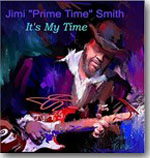 It's
My Time (New Folk Records) is Jimi “Prime
Time” Smith's first solo album in 15 years,
but the Phoenix resident hasn't exactly been
idle during that time, playing or recording with
Bob Corritore and Bernard Allison, among others.
Smith, a Chicago native is the son of Johnnie
Mae Dunston, one of the first female drummers
and songwriters in the blues, playing drums with
Jimmy
Reed and managing him in the '70s. It's
My Time (New Folk Records) is Jimi “Prime
Time” Smith's first solo album in 15 years,
but the Phoenix resident hasn't exactly been
idle during that time, playing or recording with
Bob Corritore and Bernard Allison, among others.
Smith, a Chicago native is the son of Johnnie
Mae Dunston, one of the first female drummers
and songwriters in the blues, playing drums with
Jimmy
Reed and managing him in the '70s.
He was influenced by
Reed, Eddie Taylor, and Hubert Sumlin, and
he has played over the years with blues legends
such as Otis Rush, Albert King, Albert Collins,
and Etta James.
Smith wrote eight of
the 11 tracks and co-produced the album with
John Wright, who also recorded and engineered
the session and plays bass, tambourine, and
acoustic guitar. Other musicians include Toby
Lee Marshall (piano/organ), Allen “The Captain”
Kirk (drums), Dave Foley (horns), and Bob
Corritore (harmonica), with Trizha Eboni
McDonald and Yolanda “Yo” Tharrington
(background vocals).
The album opens with
a rousing cover of the gospel standard, “Don't
Let The Devil Ride,” with nice vocal work from
Smith and background singers. “Back On The Road”
is a cool, slide guitar-driven tune, and
“Breaking My Heart” is a terrific blues shuffle.
“My Time” is an
excellent acoustic down-home blues, with Smith
on slide and Corritore on harp. The breezy
“Moving On” offers more great slide guitar from
Smith, who decides to put an end to a failed
relationship. Marshall has a nice piano solo on
this track, as well.
“She's A Peach” is a
superb slow blues, reminiscent of a classic
Muddy Waters track, with Smith's slide and
Corritore's harp providing an irresistible
combination. “I'm Your Friend” is a soulful
blues with horns, Memphian B3 work from
Marshall, and a heartfelt vocal from Smith.
The autobiographical
“Bluzman” also serves as a mission statement of
sorts for Smith as he relates his past, present,
and what's ahead, punctuating the tale with some
splendid fretwork along the way. “Your Love” is
a slow burning urban blues with B3 and horns
backing Smith's guitar and vocals.
Smith closes the
album with two Luther Allison tracks, the first
being the emotional “Will It Ever Change,” from
Allison's final album, Reckless, in 1997,
a tune that's still a solid fit in today's
world. The final track is “Serious,” a smoky
blues ballad originally recorded by Allison in
the mid '80s that demonstrates Smith is as
comfortable on the soul side of the aisle as he
is on the blues side.
While we've been
hearing Jimi “Prime Time” Smith fairly regularly
over the past 15 years. His late 2022
collaboration with Corritore, The World In A
Jug, deserves to be heard if you haven't
already.
It's great to have
another solo release from him and, to these
ears, It's My Time stands as his best to
date. Hopefully, we won't have to wait 15 years
for the next one.
--- Graham Clarke
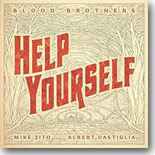 The
Blood Brothers (Mike Zito and Albert
Castiglia) reunite for a second studio effort,
Help Yourself (Gulf Coast Records), which
continues the duo's foray into their fusion of
blues, soul, and rock. With support from Scot
Sutherland (bass), Lewis Stephens (keys), Matt
Johnson and Ray Hangen (drums), Zito and
Castigliia tear through a dynamite ten-song set
(recorded live in the studio) consisting of nine
originals and one cover. The
Blood Brothers (Mike Zito and Albert
Castiglia) reunite for a second studio effort,
Help Yourself (Gulf Coast Records), which
continues the duo's foray into their fusion of
blues, soul, and rock. With support from Scot
Sutherland (bass), Lewis Stephens (keys), Matt
Johnson and Ray Hangen (drums), Zito and
Castigliia tear through a dynamite ten-song set
(recorded live in the studio) consisting of nine
originals and one cover.
The title track,
written by Zito, opens the disc. It's a crunchy
blues rocker about taking care of business
yourself, depending on no one else. Castiglia's
“Can't Be A Prophet” is a gritty tale about the
thrills of life on the road compared to coming
back to earth when you return home. Meanwhile,
the ballad “Alive” is a heartfelt love song
written by Zito for his new love, who brought
him back from the brink after the loss of his
wife.
The band gets a
chance to strut their stuff on the funky
instrumental “Soulard Serenade,” before jumping
into the album's lone cover, a rocking read of
J.J. Cale's “Low Down.” “The Best I Can,”
co-written by Zito and Castiglia, is a soulful
mid-tempo number looking at a relationship on
the skids, and Zito's “Prove My Love” finds him
desperately trying to keep the fire alive in a
romance.
Castiglia's “Ol'
Vicrola” is a cool, retro rocker that looks at
classic tunes of the past on a vintage record
player.The tense “Running Out Of Time,” from
Zito, has a restless energy as it recounts an
urgent race to the border, and the album closer,
“Do What You Gotta,” by Castiglia, really cooks
as both guitarists let loose with all their
might.
With Help
Yourself, the Blood Brothers have another
winner on their hands, and continue to set the
bar high for modern blues rock with their
well-crafted songs and gritty performances.
Hopefully, Zito and Castiglia will continue to
work together. It's obvious there's great
chemistry between them and the band.
--- Graham Clarke
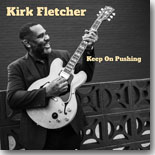 It's
good to have guitarist Kirk Fletcher back
in action after his career was affected by a
stroke a couple of years ago. His return is
celebrated with the release of a new album,
Keep On Pushing (VizzTone), a message to
himself after his health scare. Recorded in
Nashville and co-produced by JD Simo, this new
release shows Fletcher hasn't lost a thing. It's
good to have guitarist Kirk Fletcher back
in action after his career was affected by a
stroke a couple of years ago. His return is
celebrated with the release of a new album,
Keep On Pushing (VizzTone), a message to
himself after his health scare. Recorded in
Nashville and co-produced by JD Simo, this new
release shows Fletcher hasn't lost a thing.
The first sign that
he was every bit the guitar player as before
came to us in July when the single from the
album was released. Fletcher tears it up on the
instrumental "Croke," with his guitar gymnastics
hinting at a sound that I haven't heard since
Danny Gatton was alive and active. The steady
blues beat of drummer Jason Smay propels the
song forward.
Fletcher has been
known more as a guitarist player who sometimes
sings, but I like his voice on the eight cuts on
which he handles vocals. At times the vocals are
more reserved and mellow, which perhaps could be
a result of how they were mixed, but overall his
voice is pleasing to the blues lovers' ears.
I especially like
the opening number, Ted Barrett's blues classic
"It's Love Baby," with Fletcher putting plenty
of power into his vocals. Another keeper is the
title cut, his own mid-tempo blues, "Keep On
Pushing," with perfect vocals and exquisite B.B.
King-style guitar.
He goes back quite a
few decades with both the Big Bill Broonzy
classic, "Just A Dream," ending with a hot
guitar solo, and Arthur Crudup's up-tempo
stomper, "I'm Gonna Dit Myself A Hole." The
latter has a "live in the studio" feel, but this
is one that I wished the vocals had been a
little louder. The same applies to the Eddie Bo
New Orleans gem, "Every Dog Hs Its Day."
On the subject of
older tunes, Fletcher's understated rendition of
Percy Mayfield's slow blues, "Lost Love," is a
delight. The tempo picks up as the song goes on
with more juice in the guitar parts. Fletcher's
vocals are just right on another older slow
blues, Lowell Fulson's "Think Twice Before You
Speak." The tempo is even slower on T-Bone
Walker's "Here In The Dark," with very mellow
vocals from Fletcher.
Closing the album is
another instrumental, "Blues For Robert
Nighthawk," with raw Delta-style guitar and
limited instrumentation that allows us to feel
the spirit of Nighthawk and other guitarists
from that era.
This album makes me
happy, because I've enjoyed every previous album
from Kirk Fletcher, as well as hearing him with
the various bands for which he recorded over the
years. I'm glad he's back with Keep On
Pushing and looking forward to more from
this very fine guitarist.
--- Bill Mitchell
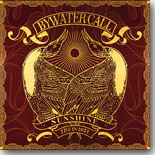 While
I've never seen Toronto soul/blues/rock band
Bywater Call in person, I've watched enough
of their concert videos on YouTube to know that
they are an outstanding live band. Thus, it's
significant that their latest album is a live
one, Sunshine Live, consisting of six of
their standard numbers stretched out to give the
band members plenty of time to jam. While
I've never seen Toronto soul/blues/rock band
Bywater Call in person, I've watched enough
of their concert videos on YouTube to know that
they are an outstanding live band. Thus, it's
significant that their latest album is a live
one, Sunshine Live, consisting of six of
their standard numbers stretched out to give the
band members plenty of time to jam.
Through their
previous studio albums and concert videos, I've
come to absolutely love the energetic vocals of
Meghan Parnell, and of course she doesn't
disappoint on Sunshine Live. She's the
presence in the front of the stage, but the
excellent guitarist Dave Barnes has to be
heard to be believed. Overall, it's a very tight
band rounded out by Mike Meusel (bass), Bruce
McCarthy (drums) John Kervin (keyboards) Julian
Nalli (sax), and Stephen Dyte (trumpet).
Opening the show is
"Sunshine," the song that gave the album its
name. It's a funky blues/soul, with the various
instrumentalists playing off each on their
respective solos. We get an especially tasty sax
solo from Nalli. The killer cut here is the
slow, soulful ballad, "Bring Me Down,"
originally done on their early Bywater Call
album. Plenty of hot guitar work from
Barnes, while Parnell's voice really soars,
especially as the tempo and volume grow
throughout the nearly 10 minutes in length.
"As If," from the
most recent studio album, Shepherd, has
always been one of my favorite Bywater Call
songs. Barnes presents a very nice, snaky guitar
solo on this aggressively funky tune. Another
single is an outstanding version of "Love The
One," which to my knowledge they've not
previously recorded. It stretches out for more
than 10 minutes, giving every band member the
chance to show off. This rendition could now be
called a soul classic.
The slow, gospel-ish
"Sign Of Peace," also first appeared on the
Shepherd album. I loved the message
delivered on the studio version, and this one is
just as powerful, a showcase for Parnell's
influential voice.
This live show wraps
with "Everybody Knows," also from the
Shepherd album. It starts with a very slow,
eerie intro before transitioning into a
mid-tempo soul. We hear big horns, powerful
vocals, and a fiery Allman-style guitar solo.
Bywater Call is one
of the more intriguing bands on both sides of
the border. If you're new to this group,
Sunshine Live is a good place to start, but
I guarantee it will be the gateway to you
acquiring their earlier studio albums.
--- Bill Mitchell
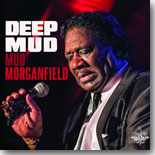 Deep
Mud (Nola Blue Records) is the latest from
Mud Morganfield, who will be forever introduced
as one of the sons of Muddy Waters. The fact
that vocally he sounds very similar to his late
father continues to connect the two Morganfields,
for better or worse. Deep
Mud (Nola Blue Records) is the latest from
Mud Morganfield, who will be forever introduced
as one of the sons of Muddy Waters. The fact
that vocally he sounds very similar to his late
father continues to connect the two Morganfields,
for better or worse.
While Mud continues
to cover some of his father's music, Deep Mud
represents a branching out into different
sounds, and we should support that effort. After
all, Muddy received criticism back in the day
when he had the audacity to plug his guitar into
an amplifier, basically setting the groundwork
for Chicago blues as we have known it for
decades.
Morganfield handles
vocals on all 14 tracks and plays bass on one
number. He's backed by a wide array of regular
Chicago session cats, most notably the
outstanding harmonica player Studebaker John,
who also produced the album. Two guitar players,
Rick Kreher and Mike Wheeler, are included on
most cuts, but I'm not able to identify who
handles which solos. I'll just settle it by
saying both are very fine players.
Once I got used to
the more urban sound he put into some of the
songs, I liked every cut. He wrote all but two
of songs, starting with his own mid-tempo 12-bar
blues, "Bring Me My Whiskey," opened by
Studebaker John's harmonica fills before
Morganfield comes in on his typical deep, gruff
vocals. "Big Frame Woman" is a funky Chicago
blues, highlighted by Sumito Ariyo Ariyoshi's
piano accompaniment.
The first of the two
Muddy Waters originals, "Strange Woman," is an
eerie, slow blues, with Mud's vocals framed by
Studebaker's harmonica parts. These two Chicago
regulars sure work well together. We get funky
again on the mid-tempo "Don't Leave Me," as Mud
confesses to his woman all of the mistakes he
made but asking (or telling) her not to walk out
that door.
Going into a more
urban sound on "She's Getting Her Groove On,"
with crowd noise in the background at times.
Contributing to the different sound is the
trumpet playing of Phil Perkins, which he makes
sound like an entire horn section, and Roosevelt
Purifoy's smokin' organ solo. As explained
earlier, it's a different sound from
Morganfield, but I like it.
Back to a more
traditional Chicago blues sound on "Ernestine,"
a mid-tempo blues with Purifoy's piano playing
heavy into the mix and Mud's vocals a little
more powerful and commanding. "Strike Like
Lightning" was written by Mud, but it sure
sounds like something Muddy would have done
during his prime. It's a slow swampy blues with
Studebaker packing plenty of emotion into his
harp. One of our guitar players lays down solid
slide guitar work and later a solo that summons
the spirit of Muddy. "Strike Like Lightning"
just might be the best cut of the album, in part
because it takes us into the deep south.
Mud and the band get
funky again on "Cosignor Man," with Perkins
again putting out a big wall of sound and
Purifoy pounding out a very fine piano solo.
It's a 12-bar blues with plenty of soul,
especially with the female backing singers.
"Lover Man" is a very up-tempo blues shuffle
that gives Studebaker the chance to show off on
the harmonica.
The woman singers,
Felicia Collins and Kristen Lowe, are back to
give the gentle slow 12-bar blues, "In And Out
Of My Life," a soulful vibe, with Ariyoshi back
on piano. We get more Muddy-style guitar on the
slow blues, "The Man That You're With," as
Mud's impassioned vocals tell that woman, "... I
may not be the man you want, but I'm the man
you're with ..." Making this cut even better are
back to back slide guitar and harmonica solos.
It almost sounds like the spirits of Muddy and
Little Walter worked their way into the session.
"Carolina" is an
up-tempo 12-bar blues, with Mud singing about
that love of his, leading into the second Muddy
original, the slow, plodding blues, "Country
Boy," first recorded for Chess Records in 1951.
Melvin "Pooky Styx" Carlisle provides the bass
drum beat that slowly leads the song through its
paces. Great version. Muddy would be proud.
Putting the wraps on
Deep Mud is a five-minute tribute to his
mother with "A Dream Walking," a slow blues on
which Mud acknowledges that his father was a
rolling stone but that she was always there for
him, being strong in raising her children.
Purifoy takes it to church for one more very
nice organ solo, with background vocals by
Demetrius M. Hall and Jacole Avent providing a
large dose of soul.
Mud Morganfield is
doing his best to not just be known as "Muddy's
son," instead doing his own songs often in a
different style. He'll likely never stray too
far from his roots, but I'm enjoying his walks
over to the other side of the street.
Deep Mud is
another fine example of both his singing and
songwriting skills. I recommend it.
--- Bill Mitchell
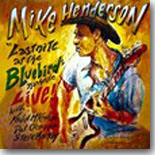 The
late Mike Henderson spent 40+ years in
the music business, playing guitar and/or
harmonica on hundreds of sessions for artists
that included Waylon Jennings, Emmylou Harris,
John Hiatt, Albert King, Guy Clark, Sting, Bo
Diddley, the Fairfield Four’s Isaac Freeman,
Patty Loveless, Bob Seger. He also wrote songs
for various country, blues, and soul artists,
including Kenny Rogers, Travis Tritt, Patty
Loveless, Marty Stuart, The Fabulous
Thunderbirds, and Solomon Burke. The
late Mike Henderson spent 40+ years in
the music business, playing guitar and/or
harmonica on hundreds of sessions for artists
that included Waylon Jennings, Emmylou Harris,
John Hiatt, Albert King, Guy Clark, Sting, Bo
Diddley, the Fairfield Four’s Isaac Freeman,
Patty Loveless, Bob Seger. He also wrote songs
for various country, blues, and soul artists,
including Kenny Rogers, Travis Tritt, Patty
Loveless, Marty Stuart, The Fabulous
Thunderbirds, and Solomon Burke.
Henderson led
several bands, including country band The
SteelDrivers (with bandmate Chris Stapleton),
the Bluebloods, and the Bel Airs, who released
an album for Blind Pig Records in 1984. One of
Henderson's favorite places to play was the
Bluebird Cafe in Nashville, enjoying a regular
Monday-night residency at the famed venue.
Last Nite at the
Bluebird - Live (Qualified Records) captures
Henderson with the last lineup of the Mike
Henderson Band (Kevin McKendree – piano, Steve
Mackey – bass, Pat O'Connor – drums) as the band
rips through a powerhouse eight-song set that
captures the fire and fury of the band, along
with a taste of Henderson's rapport with his
audience.
The set opener is an
original, “Weepin' & Moanin',” with Henderson
providing a superb, sizzling guitar intro
complemented by his gritty vocals. Henderson
ends the song with a humorous explanation of the
show to follow, pointing out that it's “Blue
Monday” and the “sensitive songwriters” have the
night off.
The second track is
a rough and rowdy cover of Blind Lemon
Jefferson's “Matchbox,” with spirited work from
the band in support of Henderson, and a
wonderfully raw read of the J.B. Hutto slide
fest “Too Much Alcohol,” with searing slide
guitar from Henderson carrying the day.
The sound and fury
settle back for a subdued (well, as subdued as
this set gets) version of Mercy Dee Walton's
“One Room Country Shack,” giving McKendree and
Henderson a bit of room to stretch out on their
respective instruments.
“When I Get Drunk”
is a wild and woolly song that the band rips
through with reckless abandon, and Henderson
breaks out the harmonica for a fun romp through
Big Walter Horton's “Have A Good Time.”
“Pay Bo Diddley” is
a revised version of “Hey Bo Diddley,” and is a
regular tune from the band's repertoire, a
lament about how one of rock n' roll's pioneers
was never fairly compensated for his
contributions. Henderson really takes off into
orbit on guitar during this one.
Henderson takes a
breather to introduce the band to the audience
before launching into a scorching cover of Hound
Dog Taylor's “Gimme Back My Wig,” bringing the
set to an appropriately raucous close.
Listening to this
incredible set makes me regret that I never had
the opportunity to hear Mike Henderson perform
in person (he passed away unexpectedly in
September of 2023).
Blues fans who like
it raw but righteous will want to give Last
Nite at the Bluebird – Live a spin or two.
The band still plays the Bluebird on Monday
nights, with Yates McKendree now fronting the
band in place of Henderson.
--- Graham Clarke
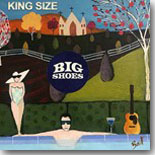 Big
Shoes, the Nashville-based supergroup have
played with nearly everybody who's anybody over
their careers. The band (Lynn Williams – drums,
Will McFarlane – guitar/vocals, Bryan Brock –
percussion, Mark T. Jordan – keyboards/vocals,
Rick Huckaby – lead vocals/guitar, Kenne Cramer
– guitar, Tom Szell – bass) originally formed as
a tribute band to Little Feat, but decided to
start writing their own songs, leading to making
their own albums. Big
Shoes, the Nashville-based supergroup have
played with nearly everybody who's anybody over
their careers. The band (Lynn Williams – drums,
Will McFarlane – guitar/vocals, Bryan Brock –
percussion, Mark T. Jordan – keyboards/vocals,
Rick Huckaby – lead vocals/guitar, Kenne Cramer
– guitar, Tom Szell – bass) originally formed as
a tribute band to Little Feat, but decided to
start writing their own songs, leading to making
their own albums.
King Size
(Qualified Records) is their fourth and latest
release, featuring 13 songs, nine of which are
originals written or co-written by the band.
Produced and mixed by Kevin McKendree at his
studio, The Rock House, in Franklin, Tennessee.
The Muscle Shoals Horns (Steve Hermann –
trumpet, Jimmy Boland – tenor/baritone saxes,
Charles Rose – trombone/arrangements) also
appear on several tracks.
The horns drive the
opening track, “Halfway To Memphis,” a pleasant
mix of rock and soul like they still do it in
Muscle Shoals. The gritty “Can I Take You With
Me” has a definite blues feel with a heaping
helping of fretwork to carry the day.
“Right About Now” is
a soulful mid-tempo number that gives a nod to
Little Feat with it's snaky rhythm and guitar,
while the amusing title track adds a taste of
funk and blues to its story about a lad being
sent to pick up king size Chesterfields for his
mother.
The crisp shuffle,
“I Don't Need Nobody,” is a cool tune with the
lively horn section, keyboards, and driving
rhythm support. The ballad “Hurry Up Slowly”
would be a snug fit in the blues, soul, or
country categories, as would “Every Song I
Sing,” which follows.
“'Til He's A Memory”
is a rootsy, mid-tempo number, and “You Just
Know” deftly mixes country and soul as Huckaby
looks back on what might have been.
On “Make It Easy On
Yourself,” written and recorded by Buckwheat
Zydeco in the mid-'90s, the band turns the funk
up to 10.With the catchy “Yvette,” the band has
a song that would be a hit if the music world
made any sense at all; it's an easy fit on the
rock or country charts.
“Too Many Bees” is a
great song about scoping the scene at a club
loaded with female prospects, and “She's A
Pain,” written by Jesse Ed Davis, includes slide
guitar and describes a woman who's a lot to
take, but still worth a shot.
Fans of blues, rock,
and soul will certainly dig Big Shoes. King
Size is loaded with outstanding,
well-crafted original songs and excellent
musicianship that are well worth your time.
--- Graham Clarke
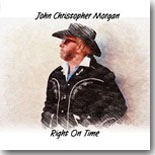 Drummer
/ vocalist John Christopher Morgan grew
up in Michigan, where he was exposed to Motown
at an early age. His parents were both
musicians, as were his brothers, so naturally he
became one as well, focusing on the drums. After
touring Europe with Weather Report and Willie
Bobo, Morgan joined up with Wayne Kramer and
Johnny Thunders, eventually joining up with the
band Gang War. Drummer
/ vocalist John Christopher Morgan grew
up in Michigan, where he was exposed to Motown
at an early age. His parents were both
musicians, as were his brothers, so naturally he
became one as well, focusing on the drums. After
touring Europe with Weather Report and Willie
Bobo, Morgan joined up with Wayne Kramer and
Johnny Thunders, eventually joining up with the
band Gang War.
He returned to
Detroit and backed up guitarist Jim McCarty,
Mitch Ryder, Eddie Burns, and others before
settling in California, recording with Robert
Lucas, King Ernest, and Lester Butler.
Morgan recently
released his debut album as a frontman, Right
On Time, featuring 13 tracks, nine of which
are written or co-written by the drummer.
Lending Morgan a hand are guitarists Albert Lee,
Franck Goldwasser, and Zach Zunis, keyboardist
Martin “Nutty Brown” Gagnon, vocalists Jamie
Wood, Viva Vinson, and Marcella Detroit, with
harmonica ace RJ Mischo appearing on several
tunes.
Lee contributes
guitar on the country-flavored romp “Vidalia,”
paying tribute to the Mississippi River town in
Louisiana across from Natchez. Huey Lewis' doo
wop tune “Bad Is Bad,” a hit in the mid '80s, is
given a Chicago shuffle treatment with tasty
harp from Mischo.
“Trouble Is My
Business” is a noir-ish track with Morgan
narrating with a laconic delivery that's a
perfect fit for the song, while “Last Heartbeat”
is a lilting, soulful number. The moody “San
Buenaventura” offers a female vocal with a
twangy Duane Eddy line on guitar straight from
the '60s.
“Ain't We All In It
Together” is a rocking soul number with Morgan
given a spoken-word narration with help from
Vinson on vocals and Zunis on guitar. “Black Bag
Blues” is a stirring tribute to the late King
Ernest and Lester Butler, who Morgan once worked
with.
“The Jeweler's
Daughter” is a rousing 12-bar blues that paints
an amusing picture with its male / female vocal
exchanges, while the cover of Guitar Slim's
“Done Got Over It” includes jungle drums and
surf guitar accompaniment in a completely unique
version.
“Jumpin' With Leon”
is a swinging instrumental with Goldwasser on
guitar backed by an outstanding horn section,
and “Black Bottom Blues” is a slow burner Delta
blues with Mischo's harp backing Morgan's somber
vocal missing days and musicians gone by. The
cover of Bo Diddley's “Let The Kids Dance” is a
lively romp, and the Cajun-styled title track
closes the disc, bringing Lee back on guitar.
This is a
well-crafted disc with a lot of variety that
touches on blues, soul, and roots music. The
original songs are very good and Morgan has a
fine voice that fits all of the styles played
like a glove.
John Christopher
Morgan may have waited a bit before stepping out
on his own, but he learned his lessons well and
has put together a fine debut release with
Right On Time.
--- Graham Clarke
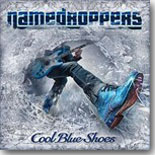 The
Name Droppers (Rafe Klein – guitar, Ron
Rifkin – piano, Bobby “T” Torello – drums, Scott
Spray – bass) have backed a host of blues and
rock legends, including Johnny and Edgar Winter,
the Rascals, and Grace Slick. They also backed
Charlie Karp in the original incarnation of The
Name Droppers until Karp's death in 2019, when
they decided to continue the band in his memory. The
Name Droppers (Rafe Klein – guitar, Ron
Rifkin – piano, Bobby “T” Torello – drums, Scott
Spray – bass) have backed a host of blues and
rock legends, including Johnny and Edgar Winter,
the Rascals, and Grace Slick. They also backed
Charlie Karp in the original incarnation of The
Name Droppers until Karp's death in 2019, when
they decided to continue the band in his memory.
The band's fifth and
latest release is Cool Blue Shoes
(Horizon Music Group), consisting of seven
originals from the band plus three covers.
Klein takes lead
vocals on the first two tracks, opening with a
terrific cover of Howlin' Wolf's “Killing Floor”
that really cooks, followed by the rocking title
track, a “cool” track indeed.
Rifkin takes the mic
for his own “Be Alright,” which has a funky R&B
feel. Klein returns to sing “Keep Pushin',” a
briskly-paced blues rocker, and the moving
“That's The Way My Love Is,” written by Mick
Jones for Foreigner.
The gritty “Hard
Way” features vocals from Klein, backed by
Rifkin, and Torello, and the three share lead
vocals on a rousing cover of Willie Dixon's “I
Cry For You.” Torello takes lead on the humorous
blues shuffle “Think Yiddish,” and Rifkin sings
on Klein's exuberant call and response “Yes I
Will.”
The closer features
Klein taking a soulful vocal on the ballad “Out
of This Blue,” backed by Simone Brown's sultry
background vocals and Bill Holloman's sax.
Cool Blue Shoes
is another classy, rock-solid release from The
Name Droppers, featuring excellent songwriting
and performances that will surely satisfy blues
fans.
--- Graham Clarke
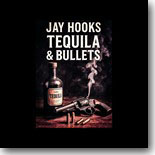 Texas
blues rocker Jay Hooks was born in
Houston and toured with Miss Lavelle White
before fronting his own band in the late '90s.
He released albums on Sunburst and Provogue
Records before stepping away from the music
scene for a decade or so. Hooks returned with a
vengeance in 2018, performing with Mark May. Texas
blues rocker Jay Hooks was born in
Houston and toured with Miss Lavelle White
before fronting his own band in the late '90s.
He released albums on Sunburst and Provogue
Records before stepping away from the music
scene for a decade or so. Hooks returned with a
vengeance in 2018, performing with Mark May.
Tequila & Bullets
(Joplin Street Music) is the singer/guitarist's
first studio release since the early 2000s.
Hooks is backed by
Matt Johnson (drums/producer), Brock Proctor
(bass), and Barry Seeland (keyboards). The album
opens with the scorcher “Evinrude Boat Motor,”
with sizzling guitar work from Hooks, followed
by the title track, a gritty, mid-tempo rocker.
“A Woman Like You”
is a tough rock ballad with great guitar and
vocals from Hooks. “Lonesome” is one of several
tunes that are reminiscent of Johnny Winter's
sometimes furious fretwork, Winter being a
particular guitar hero of Hooks. “Your Touch” is
another Winter-esque track, both instrumentally
and vocally.
“Left Me Cold” and
“Mind Full” are both powerful rockers loaded
with muscular guitar work and rock-solid rhythm
work, and Hooks does a cool cover of Rory
Gallagher's “Mississippi Sheiks,” paying tribute
to the legendary guitarist and the pre-war blues
pioneers at the same time.
“Redneck Shit” is a
fun roadhouse raver. “I Was Wrong” is a scrappy
blues rocker, while “”My Kinda Fine” has a
southern rock feel.
The closing track is
“Mexican Larry,” a slow blues narrative about a
unique problem solver that features some of
Hooks' best guitar playing on the disc.
Tequila & Bullets
is a gripping, high-energy set of blues rockers
that prove it's been too long since Jay Hooks
was in the studio. Hopefully, he won't take as
long between releases next time around.
--- Graham Clarke
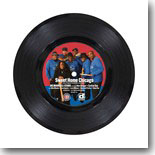 Delmark
Records recently collaborated with the Chicago
Cubs to record a special 45 version of “Sweet
Home Chicago.” The Delmark All-Stars (Bob
Stroger – vocals, Carlise Guy – vocals, Mike
Wheeler – vocals/guitar, Dave Specter – guitar,
Larry Williams – bass, Roosevelt Purifoy –
organ, and Melvin “Pooky Styx” Carlisle – drums)
put together a terrific cover of the Windy City
classic, along with an interesting “BBQJr”
(Johnny Iguana and Jeffrey Qaiyum) re-mixed take
for Side B. Delmark
Records recently collaborated with the Chicago
Cubs to record a special 45 version of “Sweet
Home Chicago.” The Delmark All-Stars (Bob
Stroger – vocals, Carlise Guy – vocals, Mike
Wheeler – vocals/guitar, Dave Specter – guitar,
Larry Williams – bass, Roosevelt Purifoy –
organ, and Melvin “Pooky Styx” Carlisle – drums)
put together a terrific cover of the Windy City
classic, along with an interesting “BBQJr”
(Johnny Iguana and Jeffrey Qaiyum) re-mixed take
for Side B.
The Cubs/Delmark
partnership came about during a game at the
beginning at the season, with a video in tribute
to the history of electric blues. The All-Stars
performed before and after the game, and the
94-year-old Stroger threw out the first pitch.
The Cubs are also
using a blue jersey with blues-inspired
typography and a sleeve patch shaped like a
guitar pick in selected games this season.
Hopefully, the collaboration will help the Cubs
this season. They're currently in second place
in their division at this time (first in the
Wild Card hunt).
--- Graham Clarke
 The
rock n' roll legend Dion has a new
release, The Rock 'n' Roll Philosopher,
scheduled for October 24th to coincide with his
upcoming book of the same title. The album, to
be released on KTBA Records, and book are a
reflection of Dion's life's journey, and should
be on any music fan's list. The
rock n' roll legend Dion has a new
release, The Rock 'n' Roll Philosopher,
scheduled for October 24th to coincide with his
upcoming book of the same title. The album, to
be released on KTBA Records, and book are a
reflection of Dion's life's journey, and should
be on any music fan's list.
The label recently
issued the album's first single, “I'm Your
Gangster of Love,” which was co-written by Dion
and Mike Aquilina. The song is a gritty blues
rocker with lots of swagger that showcases a
strong vocal from Dion and powerful guitar work.
Based on this track,
it sounds like Dion's new album will be
must-listening for blues fans.
--- Graham Clarke
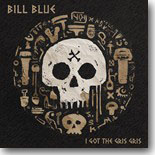 Bill
Blue was a veteran of the blues scene,
playing with the Arthur “Big Boy” Crudup band
until Crudup's death in 1974, and recording with
Adelphi in the early '80s before taking a hiatus
and moving to Key West where he didn't record
for a quarter century. Bill
Blue was a veteran of the blues scene,
playing with the Arthur “Big Boy” Crudup band
until Crudup's death in 1974, and recording with
Adelphi in the early '80s before taking a hiatus
and moving to Key West where he didn't record
for a quarter century.
He eventually met
producer Ian Shaw, who persuaded Blue to record
a pair of fine albums. Blue passed away from
throat cancer in 2022, but Shaw is now releasing
some previously unheard Bill Blue sides. First
up is the single “I Got The Gris Gris” (Conchtown
Records), a swampy blues with Blue's feral growl
and his searing guitar work front and center.
Shaw promises more
Blue tracks on an upcoming album to be released
this fall.
--- Graham Clarke
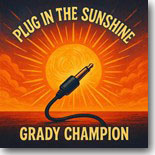 Grady
Champion's latest single, “Plug In The
Sunshine,” is a positive track that encourages
listeners to “get back some of the good times
that the hard times stole.” Champion
collaborated with Eddie Cotton on this tune,
which is a keen mix of blues and R&B that should
appeal to blues fans across the aisles ---
.those who dig modern blues and those who like
more traditional fare. Grady
Champion's latest single, “Plug In The
Sunshine,” is a positive track that encourages
listeners to “get back some of the good times
that the hard times stole.” Champion
collaborated with Eddie Cotton on this tune,
which is a keen mix of blues and R&B that should
appeal to blues fans across the aisles ---
.those who dig modern blues and those who like
more traditional fare.
It's an inspiring
song that will leave you with a smile on your
face and may even lead you to focus on the good
and leave the bad behind. Given recent events in
my own household, it's already working wonders
for us.
--- Graham Clarke
 GA-20
has a new single that proceeds their upcoming
album, a tasty instrumental version of the Sam &
Dave classic soul number, “Hold On, I'm Coming.”
The current incarnation of the band consists of
founder Matthew Stubbs (guitar), Nate Edgar
(bass), Brooks Milgate (organ), and is rounded
out by Cody Nilsen (lap steel), and Josh Kiggans
(drums). GA-20
has a new single that proceeds their upcoming
album, a tasty instrumental version of the Sam &
Dave classic soul number, “Hold On, I'm Coming.”
The current incarnation of the band consists of
founder Matthew Stubbs (guitar), Nate Edgar
(bass), Brooks Milgate (organ), and is rounded
out by Cody Nilsen (lap steel), and Josh Kiggans
(drums).
Nilsen's lap steel
drives the song, with the rest of the band
helping to drive the enticing mix of blues,
country, and rock 'n' roll that makes this a
memorable version,. It will certainly have fans
on the lookout for the upcoming album, titled
Orphans.
--- Graham Clarke
 Stevie
J Blues' latest single, “I Ain't Drunk” (PK
Music), is not the mid '50s tune penned and
recorded by Jimmy Liggins and later byAlbert
Collins. This new song is a tasty mix of blues,
R&B, and funk. HEAVY on the funk. Stevie
J Blues' latest single, “I Ain't Drunk” (PK
Music), is not the mid '50s tune penned and
recorded by Jimmy Liggins and later byAlbert
Collins. This new song is a tasty mix of blues,
R&B, and funk. HEAVY on the funk.
It's an amusing
tale, a sequel to the original tune if you will,
where the singer insists he's not intoxicated,
but maybe the effects are telling a different
story. The irresistibly funky backbeat is
augmented by some of Stevie J Blues' bluesy
fretwork that lifts this already entertaining
tune up to an even higher level.
This one will
satisfy blues, R&B, and funk fans.
--- Graham Clarke
|